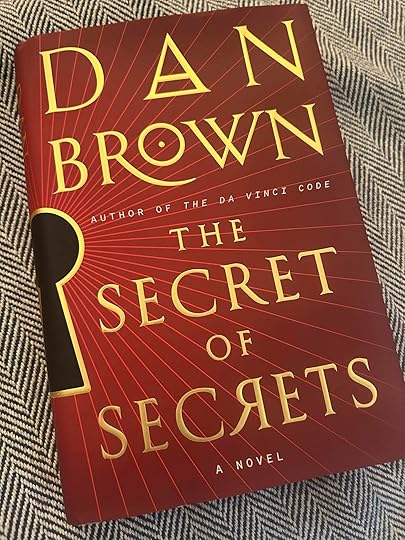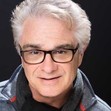Book Review - 'The Secret of Secrets' by Dan Brown
I hold Dan Brown in high respect. If you have viewed my interviews posted here, I have extolled the wisdom of his advice:
Keep making promises to the reader.

The Secret of Secrets: A Novel by Dan Brown (Doubleday)
He shares this advice in his Masterclass interview. Before I saw that session, I assumed he would be coaching writers on how to craft cliffhangers, of which he is a master. True, he did. But wrong, his advice wasn’t about cornering protagonists in locked rooms and devising clever means of escape. Those latter examples I call “Bulldog Drummond” perils. The (male) hero and his (usually female) sidekick get trapped in a closed room. In one episode of the famous old movie serial, the walls are moveable and begin to close in, threatening to crush them. In other plots, water begins to flood the space, and there is no apparent way out.
Thinking About Thinking is a reader-supported publication. To receive new posts and support my work, consider becoming a free or paid subscriber.
Nevertheless, Dan Brown is a master at crafting those kinds of scenes. And these tight situations inspire the “eye-candy” that makes patrons of movie thrillers breathless.
The revelation promised by The Secret of Secrets title will be hardly a surprise to students of recent scientific theory. Brown does not save the reveal to the very end. No, he repeats it early and often: “Consciousness is nonlocal.”
What does nonlocal mean?
Nonlocal is a technical term now used widely among theoreticians to describe physics that are not well understood, nor explainable by empirical means in a contained local environment. Among researchers in neuroscience, the controversial split is between materialist and noetic explanations of human consciousness. Materialists such as Ray Kurzweil, preeminent researcher at Google and author of the recent book The Singularity Is Nearer, nothing goes on in a human brain that can’t eventually be explained by local physical processes. So, if you build a computer that is complex enough, it will become conscious. Therefore, everything humans experience—our thoughts, our emotions, and even our sense of the timeless—occurs entirely within our own skulls.
A contrary view is expressed by the noetic scientists, typified by neurologist Christof Koch in his book The Feeling of Life Itself. Koch believes he’s investigated all possible local processes in the brain that could produce what we experience subjectively as consciousness. He finds no satisfactory explanation by applying laws of physics as presently understood. He speculates, therefore, that consciousness may be a pervasive and fundamental property of the universe. All sentient beings share in this experience to the extent that our individual bandwidth of perception permits.
Fundamental. Universal. Shared. That’s the meaning of nonlocal.
And not just Koch. None other than preeminent linguist and semantic theoretician Noam Chomsky speculates that the origin and inheritance of language is nonlocal—not arising simply from complexity of brain structure—but somehow received as shared intelligence, perhaps from what Carl Jung called the collective unconscious. Chomsky’s cohort of theoreticians contend they can be specific about when humans began to speak—about 125,000 B.C., among primitive Bushmen-Pygmy groups.
And music and dance came first! Then not speech—but clicks!
Now to the spoiler. Hang on to your topknot lest you blow your lid:
Ultimately—hardly a surprise considering the novel’s genre—the secret is the way nonlocal consciousness has been, perhaps is being, exploited by the three-letter intelligence agencies.
Fans of Dan Brown will understand that he is not only a consummate storyteller—he is also a pundit and a prophet. In his The Da Vinci Code, his villain is a follower of the secretive Catholic cult Opus Dei. Few news feeds will tell you that Leonard Leo, the billionaire who helped pack the Supreme Court, is a follower of that organization, as are several members of the high court. In Brown’s Inferno, years before the outbreak of Covid, he describes a worldwide pandemic unleashed by a research scientist who fears the main threat to human extinction is overpopulation.
In the frontmatter to The Secret of Secrets, Dan Brown states emphatically:
All artwork, artifacts, symbols, and documents in this novel are real.
All experiments, technologies, and scientific results are true to life.
All organizations in this novel exist.
Be afraid? Be very afraid?
Buddhist masters will perhaps claim that nonlocal consciousness is no new discovery.
But the notion that human brains are receivers rather than generators of our experience will be a revelation to the rest of us.
Dan Brown was a student of Phillips Exeter Academy, an exclusive private school where his father taught mathematics. Like J. K. Rowling, who studied classics at university, Brown was schooled in “dead white men’s literature.” These days, young scholars may encounter this tradition only in their novels.
Brown’s advice to continually make promises to the reader is basic. End a chapter when a question arises and before you give the answer. The reader will expect to get a reward by turning the page.
Remarkably, the chapters in this novel are short, scarcely more than a few pages. There are 141 of them (including Prologue and Epilogue). Just right for snagging the next promise while waiting for a bus or your food.
If I have a complaint about Brown, whether in this one or in his body of work, it’s his belaboring of those perilous Bulldog Drummond situations.
But, hey, those action sequences are the favorite fodder of moviemakers. Enjoy! (Just don’t expect the movie to venture very far into the deeper stuff.)
As of this writing, checking IMDBPro, the novel is not yet in preproduction. Don’t doubt it will be!

How about a dose of theology and metaphysics with your crime?
Thinking About Thinking is a reader-supported publication. To receive premium content such as podcasts, interviews, and audiobooks, consider becoming a paid subscriber.



